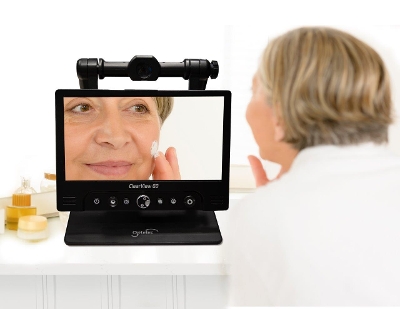Independence may mean different things to you throughout your life and could include everything from picking out your clothes every day and choosing what foods you want to eat to deciding where you live and what you do. Your independence means you get to make choices in your life without having to consult others. However, as you get older, you may feel you are becoming more dependent on family and friends and this may leave you with feelings of sadness and lack of control over your life.
If your loss of independence is due to diminishing vision, using the appropriate tools and aids will help you to retain your independent lifestyle and allow you to continue participating in the activities you enjoy the most.
5 Daily Activities and the Low Vision Aids that Help:
- Cooking – Use high-contrast cooking utensils, large-print timers, bump dots for marking frequently used buttons on the oven or microwave, finger protectors while cutting, liquid level indicators for pouring drinks, and video magnifiers for seeing ingredients and reading recipes.
- Dress and grooming – Color identifiers will help you match your clothes by color and pair outfits together for quick and easy dressing. Self-viewing video magnifiers will allow you to enlarge your face on a large monitor while applying make-up, shaving, or completing other grooming activities.

- Reading your mail – Electronic video magnifiers, handheld or desktop, are great ways to magnify printed text to a comfortable reading size. Video magnifiers that include the text-to-speech feature can also scan printed text and read it back to you if the documents are longer or your eyes are tired.
- Paying your bills – Magnify the text and what you are writing by using a desktop video magnifier. The large viewing monitor will help you see as you write checks and balance your checkbook.
- Walking from room-to-room – Improved lighting is one of the simplest solutions, but is often overlooked. The color and intensity of the light can have a profound effect on your ability to see objects and obstacles.
Discuss your concerns with your eye care professional or primary care doctor, and request to be connected to an Orientation & Mobility Specialist or a Low Vision Specialist. These professionals will be able to help you use your remaining vision to the fullest, teach you ways to move about safely, and train you on the tools and aids that can help you regain your autonomy.
Patience is the key; be patient with yourself as you learn new ways to complete tasks and be patient with those trying to assist you. Join a low vision support group if feelings of loss persist or you feel alone and would like to connect with others who share your experiences.
Connect with us if you have questions about low vision aids or would like to receive our Optelec Low Vision Essentials catalog.
Jul 07, 2020


